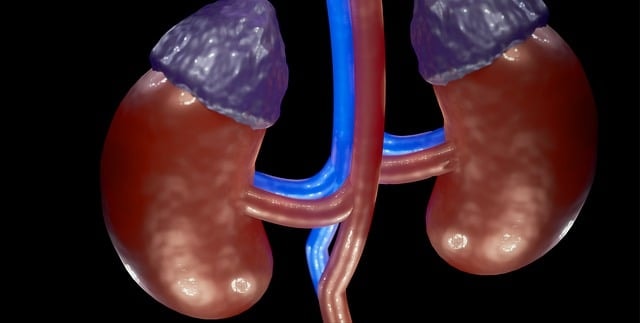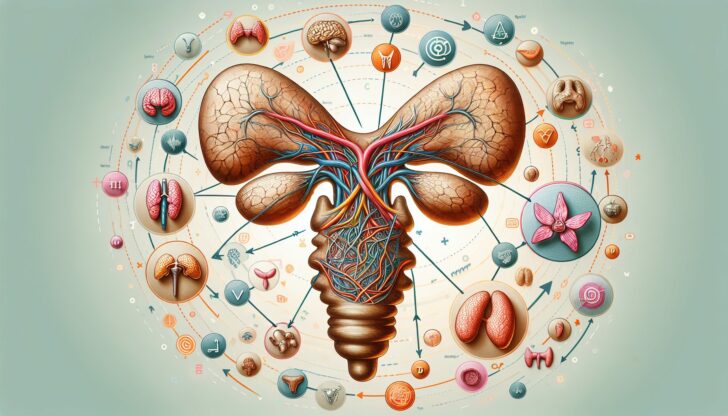Diseases of the endocrine system affect glands that produce hormones, which regulate key body functions. Common endocrine disorders, such as diabetes and thyroid issues, are examples of a disease of endocrine system that can lead to adrenal problems. Symptoms vary widely, from fatigue and weight changes to more severe complications. Understanding these diseases is crucial for proper management and treatment.
Table of Contents
Key Takeaways
Diabetes mellitus is the most common endocrine disorder, requiring management through lifestyle changes, medication, and insulin therapy to prevent serious complications.
Thyroid disorders, including hyperthyroidism and hypothyroidism, significantly impact metabolism and health; treatment often involves medication and hormone replacement therapy.
Endocrine diseases can stem from hormone imbalances, requiring tailored treatment plans that may include hormone replacement therapy, surgery, and lifestyle modifications for effective management.
Diabetes Mellitus

Diabetes mellitus is the most prevalent endocrine disease in the United States, affecting millions of people. It occurs when the body cannot properly regulate blood sugar levels due to issues with insulin production or function. There are two primary types of diabetes: Type 1 diabetes, where the pancreas produces little to no insulin, and Type 2 diabetes, where the body becomes resistant to insulin or doesn’t produce enough of it. Managing diabetes often involves lifestyle changes, medications, and sometimes insulin therapy.
The symptoms of diabetes can vary but commonly include increased thirst, frequent urination, and unexplained weight loss. These symptoms arise because high blood sugar levels cause the body to try to get rid of the excess glucose through urine. Over time, unmanaged diabetes can lead to severe complications such as heart disease, kidney disease, and nerve damage. Regular monitoring of blood sugar levels and adherence to a treatment plan help prevent long-term health problems.
The treatment for diabetes is multifaceted, involving diet and exercise changes, monitoring blood glucose levels, and medication. Insulin therapy is often necessary for Type 1 diabetes and sometimes for Type 2 diabetes. Modern advancements have made it easier to manage diabetes, but it requires vigilance and commitment from those affected. Understanding diabetes and adhering to treatment plans allow individuals to lead healthy, fulfilling lives despite the condition.
Thyroid Disorders
The thyroid gland, a butterfly-shaped gland located in the neck, plays a pivotal role in regulating metabolism and other bodily processes by producing thyroid hormones. When the thyroid glands malfunction, it can lead to significant health problems. The two main types of thyroid disorders are hyperthyroidism, where the thyroid is overactive, and hypothyroidism, where the thyroid is underactive.
These disorders can cause a variety of symptoms and health issues. Hyperthyroidism can lead to weight loss, increased appetite, and anxiety, while hypothyroidism can cause weight gain, fatigue, and depression. Effective management of these conditions begins with a solid understanding of them.
The following subsections provide a detailed exploration of hyperthyroidism and hypothyroidism, covering their causes, symptoms, and treatments.
Hyperthyroidism
Hyperthyroidism occurs when the thyroid gland is overactive and produces excessive amounts of thyroid hormones. This condition is often associated with Graves’ disease, an autoimmune disorder that causes the thyroid to enlarge and produce too much hormone. Other causes can include inflammation of the thyroid gland and excessive iodine intake.
Symptoms of hyperthyroidism can be quite broad, including weight loss, increased appetite, rapid heartbeat, and anxiety. Managing hyperthyroidism typically involves medications to reduce thyroid hormone production, radioactive iodine therapy to shrink the thyroid gland, or surgery to remove part or all of the thyroid.
Dietary modifications, such as an iodine-restricted diet, can also help manage the symptoms.
Hypothyroidism
Hypothyroidism is the opposite of hyperthyroidism, where the thyroid gland produces insufficient amounts of thyroid hormones. This condition can slow down many bodily processes, leading to symptoms like excessive weight gain, fatigue, and cold intolerance. Common causes include Hashimoto’s thyroiditis, an autoimmune disorder, and certain medications.
Treating hypothyroidism typically involves hormone replacement therapy to restore normal hormone levels. This treatment requires regular monitoring and dose adjustments to maintain proper hormone balance.
Managing hypothyroidism effectively can significantly improve quality of life and mitigate symptoms of this endocrine disorder.
Adrenal Gland Disorders

The adrenal glands, located on top of each kidney, are crucial for producing hormones that help regulate metabolism, immune response, and stress. These glands consist of two parts: the cortex, which produces steroid hormones, and the medulla, which produces adrenaline. Disorders of the adrenal glands can lead to significant health issues. The two main types of adrenal gland disorders are Cushing’s Syndrome and Addison’s Disease.
Cushing’s Syndrome is caused by excessive production of cortisol, often due to a tumor on the adrenal gland or long-term use of corticosteroid medications. On the other hand, Addison’s Disease is characterized by inadequate production of cortisol due to damage to the adrenal glands, often from autoimmune conditions.
Knowledge of these disorders and their treatment options is key to managing symptoms and improving patient outcomes.
Cushing’s Syndrome
Cushing’s Syndrome occurs when the body is exposed to high levels of cortisol for an extended period. This can result from an adrenal gland tumor or prolonged use of corticosteroid medications. Cortisol is vital for regulating metabolic processes and maintaining blood pressure, but too much can cause serious health problems.
Symptoms of Cushing’s Syndrome include weight gain, particularly around the abdomen and face, high blood pressure, and thinning skin that bruises easily.
Treatment often involves surgery to remove the tumor, if present, or adjusting corticosteroid use. Post-surgery, patients may need hormone replacement therapy to balance cortisol levels.
Addison’s Disease
Addison’s Disease, also known as adrenal insufficiency, occurs when the adrenal glands do not produce enough cortisol and sometimes aldosterone. This can lead to serious health issues, including severe fatigue, low blood pressure, and significant weight loss. The condition is often caused by autoimmune destruction of adrenal tissue.
The primary treatment for Addison’s Disease is hormone replacement therapy, which helps restore normal hormone levels and manage symptoms. Patients with Addison’s Disease need to be vigilant about their condition, as stress or illness can exacerbate symptoms, requiring adjustments in medication.
Pituitary Gland Disorders

The pituitary gland, often referred to as the “master gland,” plays a critical role in regulating other endocrine glands by producing various hormones. Disorders of the pituitary gland can lead to a wide range of health problems, depending on which hormones are affected. These disorders can be triggered by pituitary tumors or long-term use of certain medications.
Two significant pituitary gland disorders are Acromegaly and Multiple Endocrine Neoplasia. Acromegaly is characterized by excessive growth hormone production, often due to a tumor on the pituitary gland, leading to abnormal growth of bones and tissues. Multiple Endocrine Neoplasia involves the development of tumors in multiple endocrine glands, affecting hormone production and overall health.
Acromegaly
Acromegaly is a disorder that results from excessive production of growth hormone, typically due to a benign tumor on the pituitary gland. This overproduction leads to abnormal growth of bones, organs, and tissues, causing noticeable physical changes such as enlarged hands and feet and coarsened facial features.
Treatment for acromegaly often involves surgery to remove the tumor, medications to reduce growth hormone production, and sometimes radiation therapy to target any remaining tumor cells. Preventing complications and improving quality of life depend on early diagnosis and treatment.
Multiple Endocrine Neoplasia
Multiple Endocrine Neoplasia (MEN) is a group of disorders that cause tumors to develop in multiple endocrine glands, which can be hereditary. These tumors can affect hormone production and lead to a variety of symptoms depending on the glands involved. For instance, MEN can cause tumors in the parathyroid, pancreas, and pituitary glands, leading to hormone imbalances and related health issues.
Managing MEN involves regular monitoring for tumor development and hormone levels, as well as surgical removal of tumors when necessary. Genetic counseling may also be recommended for affected families to understand their risk and manage the condition proactively.
Polycystic Ovary Syndrome (PCOS)
Polycystic Ovary Syndrome (PCOS) is a common endocrine disorder affecting women of reproductive age. It is characterized by irregular menstrual cycles, infertility, and elevated levels of male hormones. These hormonal imbalances can lead to symptoms such as excessive hair growth on the face and body (hirsutism), acne, and weight gain.
Treatment for PCOS often involves hormonal birth control to regulate menstrual cycles, anti-androgen medications to reduce male hormone levels, and metformin to improve insulin sensitivity. Lifestyle changes, such as diet and exercise, can also help manage symptoms and improve overall health.
Endocrine Tumors
Endocrine tumors are abnormal growths that develop in the endocrine glands, causing hormone imbalances and related health issues. Common types of endocrine tumors include insulinomas, gastrinomas, and pheochromocytomas, each affecting different hormones and bodily functions. These tumors can lead to a variety of symptoms, depending on the hormones they affect.
Insulinomas, for instance, cause excessive insulin production, resulting in low blood sugar levels and symptoms such as weakness, seizures, and confusion. Diagnosis of endocrine tumors often involves blood tests to check for abnormal hormone levels and imaging techniques like X-rays or ultrasounds to locate the tumors.
Treatment can include surgery, medication, or radiation therapy, depending on the tumor type and location.
Learn more, Neuroendocrine tumors – Symptoms and causes
Hormone Imbalance and Its Effects
Hormone imbalances occur when there is too much or too little of a hormone in the bloodstream. These imbalances can affect various bodily functions and lead to significant health problems. The pituitary gland, often referred to as the “master gland,” plays a crucial role in regulating hormones that affect growth, metabolism, sexual function, and the endocrine system.
Stress, infection, and alterations in fluid and electrolyte balance can impact hormone levels. These factors may contribute to hormonal imbalances. Symptoms of hormone imbalances can vary widely but often include fatigue, weight changes, mood swings, and changes in sexual function related to sex hormones.
Managing hormone imbalances typically involves medication, lifestyle changes, and regular monitoring to ensure hormone levels remain balanced.
Diagnosis and Testing for Endocrine Diseases
Before:
Proper diagnosis and testing are critical for managing endocrine diseases effectively. Various tests and procedures can help identify endocrine disorders, including blood tests to check hormone levels, imaging techniques like X-rays and ultrasounds, and specialized tests such as the ACTH stimulation test for diagnosing Cushing’s syndrome.
After:
Proper diagnosis and testing are critical for managing endocrine diseases effectively. Various tests and procedures can help identify endocrine disorders, including:
Blood tests to check hormone levels
Imaging techniques like X-rays and ultrasounds
Specialized tests such as the ACTH stimulation test for diagnosing Cushing’s syndrome
Diagnosing endocrine disorders can be difficult. This is mainly due to their diverse symptoms, which often resemble those of other medical conditions. Experiencing unusual symptoms that suggest an endocrine disorder should prompt seeking medical advice and undergoing appropriate testing to determine the cause and receive necessary treatment.
Treatment Options for Endocrine Disorders
Treatment for endocrine disorders generally involves controlling hormone production or using hormone supplements to restore balance. Hormone replacement therapy is commonly used to treat conditions like hypothyroidism and Addison’s disease, where hormone levels are deficient. Effectiveness of hormone replacement therapy should be monitored through clinical response and blood tests to ensure proper dosing and management.
Surgery is often necessary for treating endocrine tumors, while medications and lifestyle changes can help manage conditions like diabetes and PCOS. Each treatment plan should be tailored to the individual’s specific condition and needs, with regular follow-ups to monitor progress and adjust treatments as necessary.
Summary
In summary, the endocrine system plays a critical role in regulating many of the body’s essential functions. Endocrine disorders, such as diabetes, thyroid disorders, adrenal gland disorders, and pituitary gland disorders, can significantly impact health and quality of life. Understanding these conditions, their symptoms, and treatment options is crucial for effective management.
By staying informed and proactive, individuals can better manage their endocrine disorders and maintain a healthier, more balanced life. If you or someone you know is experiencing symptoms of an endocrine disorder, seek medical advice and take the necessary steps to get a proper diagnosis and treatment plan.
Frequently Asked Questions
What is the most common disease treated by an endocrinologist?
The most common disease treated by an endocrinologist is diabetes, including both type 1 and type 2. This condition affects approximately 30 million Americans and is primarily due to insufficient insulin production by the pancreas.
What are rare endocrine diseases?
Rare endocrine diseases refer to uncommon disorders affecting hormone production and regulation, including conditions like adrenal insufficiency and rare tumors such as adrenocortical carcinoma and pheochromocytoma. These diseases often require specialized treatment approaches, including hormonal replacement therapy or surgical intervention.
What would happen if the endocrine system stopped working?
The cessation of the endocrine system would result in unregulated blood sugar levels, potentially leading to severe health complications or death. Additionally, the body’s ability to maintain essential functions, such as hydration and growth, would be critically impaired.
How is diabetes mellitus diagnosed?
Diabetes mellitus is diagnosed by evaluating clinical signs, measuring high blood glucose levels, and detecting glucose in the urine. This comprehensive approach ensures accurate identification of the condition.
What are the symptoms of hypothyroidism?
The symptoms of hypothyroidism primarily include weight gain, fatigue, cold intolerance, and depression. Recognizing these signs is essential for timely diagnosis and treatment.









